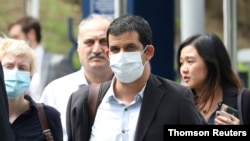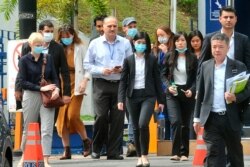Malaysia's recent moves to arrest and deport a Bangladeshi man for criticizing the government's treatment of migrant workers on a news show underscore the country's backsliding on press freedom in recent months, rights groups say.
Authorities arrested Mohamad Rayhan Kabir on July 24, weeks after revoking his work permit over an on-camera interview he gave the Qatari-based news organization Al-Jazeera's 101 East news program. In the July 3 episode, "Locked Up in Malaysia's Lockdown," he accuses the government of racism for targeting fellow migrant workers for arrest in its response to the coronavirus pandemic.
Kabir remains in custody without charge. Authorities have yet to explain what laws they suspect him of breaking, even while officials have threatened to deport Kabir and bar his return to Malaysia forever.
Authorities have moved against Al-Jazeera, too, deposing the journalists who worked on the episode in a sedition probe and accusing the Qatari news outlet of filming without the requisite licensing. Police raided its offices in Kuala Lumpur, Malaysia's capital, on Tuesday, seizing two computers.
Censorship redux
Combined with the pressure on Al-Jazeera, Kabir's arrest "clearly shows that the current authorities in Malaysia don't tolerate any independent reporting and consequently have very little respect for press freedom," said Daniel Bastard, Asia Pacific director for Reporters Without Borders (RSF).
Rights groups agree that Malaysia's media climate took a sharp turn for the worse with the surprise collapse of a reformist government in February and the return to power of the corruption-mired United Malay National Organization. Since UMNO's revival, they say, more than a dozen people have been arrested, charged or questioned for comments deemed critical of the new regime, including clean-government advocates, journalists and opposition lawmakers.
Bastard called it a "sad reminder" of the stifling press environment that mired much of UMNO's first stint in power, which ended with its defeat at the polls in 2018 to former party leader turned critic Mahathir Mohamad.
"Several journalists told RSF they don't dare anymore to cover some subjects as they would feel enabled to do under Mahathir's government," he said. "The environment has dramatically changed, and it seems self-censorship has become the new normal again."
Fear of reprisal now has news outlets censoring their readers as well.
Malaysia's attorney general dragged local online news outlet Malaysiakini into court last month over comments some readers left on its site chiding the judiciary. Taking heed, Al-Jazeera recently shut down the comments section to its 101 East episode on Malaysia's lockdown on YouTube.
Both outlets have denied any wrongdoing and stood by their reporting.
Shooting the messenger
Rights groups say Kabir's arrest will also make the millions of migrant workers in Malaysia all the more reluctant to speak to the press about alleged abuses, raising the risk that they will fester.
"Now the implication is that most other migrant workers will be completely afraid of speaking out," said Wathshlah Naidu, executive director of Malaysia's Center for Independent Journalism.
"The moment you speak out ... the investigation is not going to be on what you are alleging, but the investigation is going to be on you. And that's what happened to Mr. Kabir." she said.
The government was quick to reject the claims of racial bias Kabir and others made to 101 East, insisting the raids on migrant communities around Kuala Lumpur and its mass arrests of undocumented workers were needed to stem the spread of the coronavirus.
But even before the outbreak, reports of abuse were rife on the palm plantations and factory floors were many of Malaysia's several million migrant workers toil in conditions that can verge on what rights groups call modern-day slavery.
Matthew Bugher, Asia program director for freedom of expression advocates Article 19, said Kabir's arrest will further stifle the media's ability to bring those abuses to light.
"When people are fearful that expressing their concerns might lead to criminal charges, they're much [less] likely to report cases to authorities or to the media. And especially in cases of vulnerable populations like migrant workers, refugees, they might be scared to go to authorities, so press freedom is particularly important to bring out those types of concerns," he said.
Viral infractions
Naidu said Kabir's arrest and other efforts to muscle the media into towing the government line have even broader implications amid the pandemic.
"Especially in [the] time of COVID, where we rely very heavily on media for updated, reliable and timely information, the implication would be information would be limited, information would perhaps not necessarily be very balanced because you [journalists] may want to sort of adopt the government's position because you are working within this kind of climate of fear," she said.
That goes for reporting on the government's response to the pandemic, as well, Bugher added.
"There has been a distinct pattern under the COVID-19 crisis of media workers targeted under Malaysia’s Communications and Multimedia Act and Penal Code for simply doing their job," the International Federation of Journalists said in a statement last month.
"It is urgent for Malaysia during the COVID-19 pandemic to prioritize the public’s right to know and for the media to be able to report freely and fairly without the threat of persecution."





